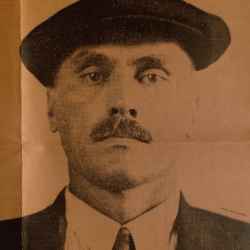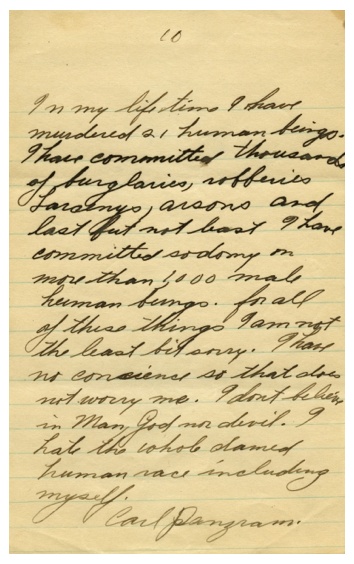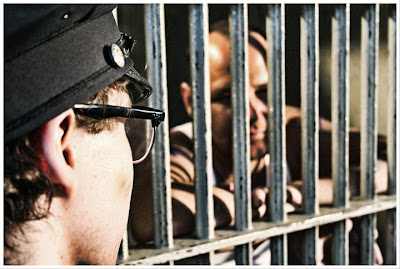A part of me wishes I could have met Carl Panzram…preferably with an inch of steel or reinforced glass between us. He was a dark man—some might say evil—and the world is probably better off without him.
Despite that, I can honestly say I’ve never read about anyone so intriguing. He was a man without emotion, empathy, or reason. He existed only to bring torment to those he felt deserved his wrath. But he was, also, a shattered end result of a broken society—physically abused by almost every person that was supposed to bring him love, guidance, and attention.

Panzram spent time in and out of jails and detention centers like most folks take vacations. But all throughout, he was continually mistreated by those in power positions. He was chained to pillars, his arms and legs stretched to painful extremes; he was even placed in a tub of water and methodologically electrocuted. And it was because of this that whatever thing festering inside Panzram infected his mind—any human semblance within him simply vanished. He had finally decided: since he was unable to hurt those who had hurt him his whole life, he would hurt others, instead. In a mad paradoxical moment, he decided that society's insufficiency in preventing people like Panzram from committing evil acts was the very reason people like Panzram even existed—that there was no karma, no God, and no reason for anything. The world was chaos' playground, and Panzram would gleefully play. This was something he stated in his memoirs,
Panzram: A Journal of Murder (originally released as
Killer: A Journal of Murder), a collection of diary entries written by Panzram himself, and pieced together with objective recreations by authors Thomas Gaddis and James Long. Panzram was a murderer, pedophile, rapist, arsonist, robber, con artist, and all around bitter-barn curmudgeon.
“I don’t believe in Man, God, nor Devil. I hate the entire human race, including myself.”

Though the man will never be cited as a positive role model in anyone’s life, one can’t help but lend a little respect to the man’s tenacity. As far as his hatred towards everything in existence went, he was exceedingly unflinching. He did terrible things—deplorable and perverted and sick—but he never made any apologies for who he was. In this day, if someone cracks an off-color joke, or says something crass without realizing their microphone is on, public apologies are then offered, and poor, sympathy-reaching reflections on a misspent childhood are brought up. When Michael Vick was charged with cruelty to animals—with hanging dogs by their legs and slicing their throats—he fell back on the whole “I wasn’t raised any better” defense, instead of him just outright stating his truth: “They’re just dogs and I don’t care. They have no value to me.” But he did the dance society demanded of him—he made apologies and paid his fees and served his time. And now he is an extremely well-paid athlete. Would his life (and finances) currently be the same if he had just told everyone the truth? Of course not. People like Vick memorize these apologetic lines and look forlorn because society demands they do. Carl Panzram—though he hated himself more than people hate their own worst enemies—never faltered in that. He never broke down and he never whined about the injustices he endured in his youth. He never outright said "I blame my family for abusing me and for the institutions for not raising me right." He blamed society, as a whole, altogether. He blamed my ancestors and yours. He blamed the intangible face of The Man, who in his eyes, was responsible for all the wrong in the world. He blamed every living thing that's ever taken a breath. If a surfer gets bit by a shark, he blames the shark—not the ocean. But Panzram did. He merely accepted that those injustices shaped who he became—and since no one person could be blamed, neither could he be for his own actions.
“When I was sitting there, a little kid about twelve or thirteen years old came bumming around. He was looking for something. He found it, too. I took him out to a gravel pit about one-quarter mile away. I left him there, but first committed sodomy on him and then killed him. His brains were coming out of his ears when I left him, and he will never be any deader.”
There is neither apology nor sick glee present in his words. He merely recounts what he did to the poor child. He makes no excuses, and panders to no easy scapegoat. Arguments could be made that the purpose of his bluntness is to shock—for sensationalistic reasons only—but those making that argument truly do not understand what kind of man Carl Panzram was. He didn’t want to shock you. He wanted to kill you. And he would have, if given the chance.
After a temporary scheme in which Panzram "hired" ten men for assistance upon his recently purchased yacht (bought with stolen cash) and eventually killed them, he was finally charged with murder. Wanting nothing more than to have his life ended, he warned the jury that decided his verdict: “If I live, I’ll execute some more of you.”
He was then sent to Leavenworth, where he was to live out the rest of his days. Upon arriving, he told the warden, “I will kill the first man who bothers me.” That first man turned out to be a guard named Robert Warnke, who Panzram later beat to death with a lead pipe in the laundry room. He was charged with the murder, and in defiance to Kansas State Law—which had previously outlawed capital punishment—he was sentenced to execution by hanging.
When the Society for Abolishment of Capital Punishment caught wind of this sentence and fought to have it overturned, Panzram literally looked through his prison bars at them and said, “I wish you all had one neck…and that I had my hands on it.”
To ensure his state-sanctioned demise, Panzram even went so far as writing letters to President Hoover, explaining that in no way was his death sentence to be overturned, and for no one to intervene in his favor at the zero hour. Not just according to his own wants, but in conjunction with everything society had always preached, he deserved death, and would not let anyone stand in the way of that.
Interestingly, Panzram’s drive towards death was not just due to his own misery in life, but also because he believed justice would not be properly served unless he was dangling at the end of a rope—and this is something he also states in his book several times. If he were to go on sucking air, it would only showcase the weakness of the judicial system. If anyone were to deserve death, it was he—and if that did not happen, then the system was flawed.
“I have no desire whatever to reform myself. My only desire is to reform people who try to reform me. And I believe that the only way to reform people is to kill 'em.”
On September 5, 1930, Carl Panzram was hung by the neck until dead. His last words were to his executioner: “Hurry it up, you Hoosier Bastard! I could hang a dozen men while you’re fooling around!”
His last will and testament stipulated that his earthly remains be left to a dogcatcher in his native Michigan…and a curse bequeathed to all of mankind (which I'm sure Panzram wrote with a wry smile.)

A film based on the book/Panzram’s life was made in the mid-90s called
Killer: A Journal of Murder, starring James Woods as Panzram and Robert Sean Leonerd as Henry Lesser, a guard to whom Panzer spoke, confided, and eventually handed over his journal scribblings that would soon become his book. While the film is not bad in any sense, most of the more lurid details from his exploits are omitted. His crimes against children are mentioned just a single time, and his claim of 1,000 acts of male sodomy is never mentioned at all. Much of Panzram's original writings are repeated by Woods almost verbatim, but so much was excised that the very thing which gave the book its power—Panzram’s own voice—wasn't as prevalent in the film; thus, it never had the chance in being as equally harrowing. The filmmakers might have been afraid of making a movie focused on an unlikeable and unrelatable monster. If that's the case, why even bother making it into a film in the first place?
Over time,
Panzram: A Journal of Murder has grown to become my favorite book. Not because of the lurid murderous details that appeal to my fascination win the ugliness of humanity, or Panzram's wry fashion in recounting them, but because it presents proof positive of the bond that developed between two very unlikely people: a murderer convict and a prison guard. For a long time, Carl Panzram was inhuman—a man whose human attributes stopped at his inherited anthropomorphism. But the respect he develops for Henry Lesser—perhaps even considering him a friend—proves that perhaps even the most hardened man isn't beyond redemption. Perhaps it's not possible to entirely kill off a person's humanity.
“In my lifetime I have murdered 21 human beings, I have committed thousands of burglaries, robberies, larcenies, arsons and, last but not least, I have committed sodomy on more than 1,000 male human beings. For all these things I am not in the least bit sorry. I have no conscience, so that does not bother me.”
"It is the nature to be deceived very easily by those who wish and have the power and the intelligence to do so. People believe what they want to believe. Truth isn't liked .. Torquemada, chief inquisitor of the Spanish Inquisition, was known as the world's greatest torturer ... I have been to Spain and while there I have visited their museums and big cathedrals where some of those old-time implements were on view. I looked 'em all over. I have read many books which told of the methods then is use. The rack, the wheel, red hot irons to burn out the eyes, pinchers to pull off parts of the body, fire to burn and water to drown ... Everything I have ever seen or read on this subject makes convinced that, though time and methods have changed, men are the same and the actual results are the same ... Torture, pain and agony is a relative thing. When pain reaches a certain point, then it has reached the limit and can be no worse ... The history of mankind goes back only for a few thousand years, but men lived an died on this earth for uncounted thousands of years before the dawn of history as we know it today. Yet in all these thousands of years men have learned little. The men of the world today are doing the same things that their ancestors did ages ago. Men have always had intelligence which has never increased. Only knowledge has kept advancing."
...
"In my life time I have broken every law that was ever made by both man and God. If either had made any more, I should very cheerfully have broken them also. The mere fact that I have done these things is quite sufficient for the average person. Very few people even consider it worthwhile to wonder why I am what I am and do what I do. All that they think is necessary to do is to catch me, try me, convict me and send me to prison for a few years, make life miserable for me while in prison and then turn me loose again. That is the system that is in practice today in this country. The consequences are that anyone and everyone can see crime and lots of it. Those who are sincere in their desire to put down crime are to be pitied for all of their efforts which accomplish so little in the desired direction. They are the ones who are deceived by their own ignorance and by the trickery and greed of others who profit the most by crime. Much depends upon the point of view of the persons who express themselves on the crime question. Those who roar the loudest and are therefore the most heard are the writers, judges, lawyers, and would-be expert criminologists. All of these people make a nice, soft living out of crime. Therefore, they are directly interested in the subject. They don't produce a damn thing. All they do is shoot off their mouths and push a fountain pen. And for doing this they live nice and soft. They wear good clothes, eat the best foods, live in nice homes, have the best of everything the world produces. They have a nice, soft graft, and they know it, too. They are not a lot of chumps like the criminals. Don't think for a minute that they are going around really meaning to do as they say they wish to. Put down crime. Not a chance. There will be no pick and shovel for that sort of people. That's what would happen to them if they really did put down crime. There is two sides to every question. My point of view is just as plausible and a damn sight more probable than all of the hot air that has been published about this question. Others who have expressed their ideas in print on this subject have all been either directly or indirectly interested in receiving some sort of profit or benefit of some kind from what they say or write or do about this crime question. Some have good jobs which they want to keep or perhaps they are trying to get a better one or perhaps they are merely incensed and prejudiced against criminals because they or their friends have been robbed or murdered. I, on the other hand, have not a single thing to gain by writing this. My life and my liberty are forfeited. I cannot gain a single thing in any way for writing this."











